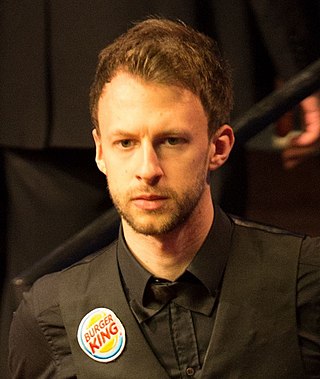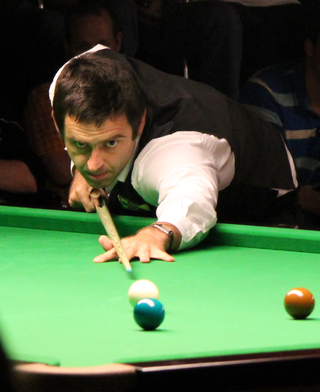
Ding Junhui is a Chinese professional snooker player. He is the most successful Asian player in the history of the sport. Throughout his career, he has won 15 major ranking titles, including three UK Championships, and in 2014, became the first Asian world number one. He has twice reached the final of the Masters, winning once in 2011. In 2016, he became the first Asian player to reach the final of the World Championship.

Ronald Antonio O'Sullivan is an English professional snooker player. Widely recognised as one of the most talented and accomplished players in snooker history, he has won the World Snooker Championship seven times, a modern-era record he holds jointly with Stephen Hendry. He has also won a record eight Masters titles and a record eight UK Championship titles for a total of 23 Triple Crown titles, the most achieved by any player. He holds the record for the most ranking titles, with 41, and has held the top ranking position multiple times.

John Higgins is a Scottish professional snooker player from Wishaw in North Lanarkshire. Since turning professional in 1992, he has won 31 ranking titles, placing him in third position on the all-time list of ranking event winners, behind Ronnie O'Sullivan (41) and Stephen Hendry (36). He has won four World Championships, three UK Championships and two Masters titles, for a total of nine Triple Crown titles, putting him level with Mark Selby and behind only O'Sullivan (23), Hendry (18) and Steve Davis (15). He first entered the top 16 in the 1995–96 world rankings and remained there continuously for over 29 years until September 2024, setting a record for the longest uninterrupted tenure as a top-16 player. He reached the world number one position four times.

The UK Championship is a professional ranking snooker tournament. It is one of snooker's prestigious Triple Crown events, along with the World Championship and the Masters. It is usually held at the Barbican, York. Ronnie O'Sullivan has won the tournament a record eight times, followed by Steve Davis with six titles and Stephen Hendry with five. O'Sullivan is the reigning champion, winning his eighth title in 2023.
The Welsh Open is a professional ranking snooker tournament that has been held annually since 1992. It replaced the Welsh Professional Championship, which ran annually from 1980 to 1991 and was open only to Welsh players. The Welsh Open is now the longest running ranking event after the World Championship and the UK Championship. Since the 2016–17 season, it has been one of four tournaments in the Home Nations Series, alongside the Northern Ireland Open, the Scottish Open, and the English Open. Since 2017, the winner of the event has received the Ray Reardon Trophy, named after the Welsh six-time world champion. Reardon himself presented the newly named trophy to 2017 winner Stuart Bingham.
The Scottish Open is a ranking professional snooker tournament held in the United Kingdom. The tournament had many name changes in its history, as the tournament was formerly called International Open, Matchroom Trophy and Players Championship. Apart from a hiatus in the 1990/1991 and 1991/1992 seasons, the tournament remained a ranking event until 2003/2004. In the 2012/2013 season the tournament was added back to the calendar as part of the Players Tour Championship minor-ranking series.

The Masters is a professional invitational snooker tournament. Held every year since 1975, it is the second-longest-running professional snooker tournament after the World Championship. It is one of the three Triple Crown events, along with the UK Championship and the World Championship. Although not a ranking event, it is regarded as one of the most prestigious tournaments on the World Snooker Tour. The reigning champion is Ronnie O'Sullivan, who won his eighth Masters title in 2024, defeating Ali Carter 10–7.

Neil Robertson is an Australian professional snooker player, who is a former world champion and former world number one. To date, he is the most successful player from outside the United Kingdom, and the only non-UK born to have completed snooker's Triple Crown, having won the World Championship in 2010, the Masters in 2012 and 2022, and the UK Championship in 2013, 2015 and 2020. He has claimed a career total of 24 ranking titles, having won at least one professional tournament every year between 2006 and 2022.

Mark Anthony Selby is an English professional snooker player. Considered one of the greatest players of all time, he has been ranked world number one on multiple occasions. He has won a total of 23 ranking titles, placing him eighth on the all-time list of ranking tournament winners. He is a four-time World Snooker Champion, and has won the Masters three times and the UK Championship twice for a total of nine Triple Crown titles, putting him on a par with John Higgins, and behind only Ronnie O’Sullivan (23), Stephen Hendry (18) and Steve Davis (15).

Judd Trump is an English professional snooker player who is a former world champion and the current world number one. Widely regarded as one of the sport's most talented players, he is currently in fourth place on the list of all-time ranking event winners, having won 29 ranking titles. He has also won four Triple Crown titles.

In snooker, a century break is a break of 100 points or more, compiled in one visit to the table. A century break requires potting at least 25 consecutive balls, and the ability to score centuries is regarded as a mark of the highest skill in snooker. Ronnie O'Sullivan has described a player's first century break as the "ultimate milestone for any snooker player". Joe Davis made the first televised century break in 1962.

The Triple Crown in professional snooker refers to winning the sport's three longest-running and most prestigious tournaments: the World Snooker Championship, the invitational Masters, and the UK Championship. In January 2020, the three tournaments were formally named the Triple Crown Series.

Kyren James Wilson is an English professional snooker player from Kettering. He has won eight ranking titles and is the reigning world champion.
Championship League is a professional snooker tournament, devised by Matchroom Sport. The tournament was originally held at the Crondon Park Golf Club in Stock, Essex, from its debut in 2008 until 2016. From 2017 it has been held in Coventry, Barnsley, Milton Keynes and Leicester.

Gary Wilson is an English professional snooker player from Wallsend in North Tyneside, Tyne and Wear.

Ronnie O'Sullivan started his professional snooker career in 1992 and is widely considered one of the greatest players in the history of the sport. His play and accomplishments are described by some peers and pundits as being the greatest in the modern era of snooker. O'Sullivan is a seven-time world champion, and holds many records, including the fastest maximum break in professional competition; the highest number of century breaks; the highest number of maximum breaks, and the most Triple Crown event titles (23).
Ronnie O'Sullivan holds the record for the highest numbers of competitive centuries and maximum breaks, as well as the fastest maximum break of all time, in the professional sport of snooker.
Judd Trump has made eight maximum breaks and more than 1,000 century breaks in the professional sport of snooker.

The Class of '92 is a group of three professional snooker players: Ronnie O'Sullivan from England, John Higgins from Scotland, and Mark Williams from Wales. All three were born in 1975, on 21 March, on 18 May, and on 5 December. They all turned professional during the 1992–93 snooker season and have become known for their collective dominance of the sport—which includes a combined 98 ranking titles, 39 Triple Crown titles, and 14 world titles—as well as their longevity as top‑ranked players. O'Sullivan has compared the Class of '92 to the Big Three of Novak Djokovic, Roger Federer, and Rafael Nadal in men's singles tennis.














